The Wicker Man (2006)
/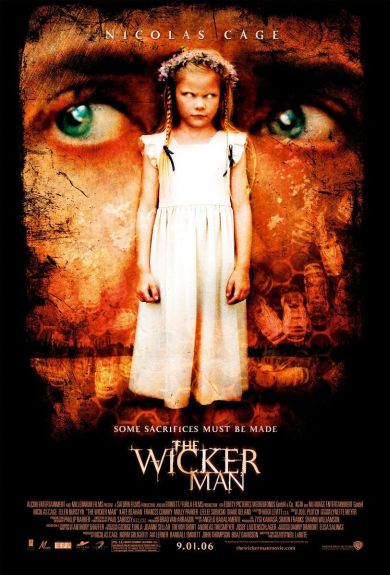
(spoilers ahead)
The Wicker Man is one of those notorious movies where it’s hard not to stumble upon YouTube clips before you’ve actually seen it. It stars Nicolas Cage and probably marks the movie that started his downward spiral during which he became known for making crappy movies and overacting wildly in them. The Wicker Man somehow qualifies for both as he acts sleepily for most of the movie before going completely over the top in the end. Is the movie crappy? That is so hard to say, at least for me. I know it is heralded as one of the most unintentionally funny movies ever and I can see that. There are definitely enough scenes that can make you laugh because they are so weird. But the director is Neil LaBute who is normally a very deliberate writer and director of thought-provoking movies that never make it easy for the viewer to make easy judgments. I have read his plays in school and really liked some of his movies (The Shape of Things, Nurse Betty). So what happened here? Cage said in interviews that they intended to make an absurd comedy but the movie does not make that clear enough. LaBute is also known for challenging gender roles and The Wicker Man is full of that. But what is the movie trying to say?
Let’s assume the following theory: Nicolas Cage plays a man called Malus (Male + Phallus) who represents the world’s misogyny and ends up on a matriarchal island that uses men for sacrifice. So we have two contrasting worldviews, one that hates women and one that thinks women are superior. This sounds interesting, so how is that concept used in the movie?
In the first scene Malus (Nicolas Cage) is not interested in flirting with the waitress in the diner, while a self-help video cover tells him “Everything’s OK!” He’s a motorcycle cop and stops a car from which a doll has been thrown out. The girl in the car “doesn’t behave” as she continues to not obey to his orders and he reassures the mother “Comes with territory.” What exactly? That women misbehave? Or that he has to pick up dolls from the street as a cop? Presumably both mother and child are killed in a car crash and the girl rather dies in the flames than to be saved by Malus. So, the movie dives into its themes right from the start and, as it will continue, in a very weird way.
Malus is traumatized and visited by a female colleague. He is not happy to see her although she seems very concerned about him, but all he says is “I don’t really need visitors.” He does not seem to be interested in women at all, which might be explained by the letter he reads in the scene in which hear from his ex-fiancée who left him. So, maybe he’s angry at women because of this break-up. She asks him for help to find her daughter and his buddy cop right away makes clear that it’s so typical of women to act this way: “And she’s got the nerve to contact you now?” The female cop comes by and Malus barely looks at her.
So he goes to Summersisle, an island full of women who make honey. A male pilot brings him there reluctantly obviously scared of the female inhabitants (he is later killed for it). Malus barges in, so to speak, repeatedly throughout the movie, always announcing that he is a cop, so he can do whatever he wants. But he is also a man, so he has twice the authority in his mind. The first women he meets don’t take him seriously at all, until they actually laughed at him at the end of their encounter. He is so disrespectful to everyone and everything on the island while the women show their utter disregard for him, which in turn baffles him. He can’t understand why he is not respected or maybe just that they are no men. He obviously can’t deal with women, so the more they ignore him, the louder and ruder he gets. Hitting his badge on the bar, claiming everyone is a suspect, repeating that he is there on “official business”, always using his authority to get respect. Which he is then denied.
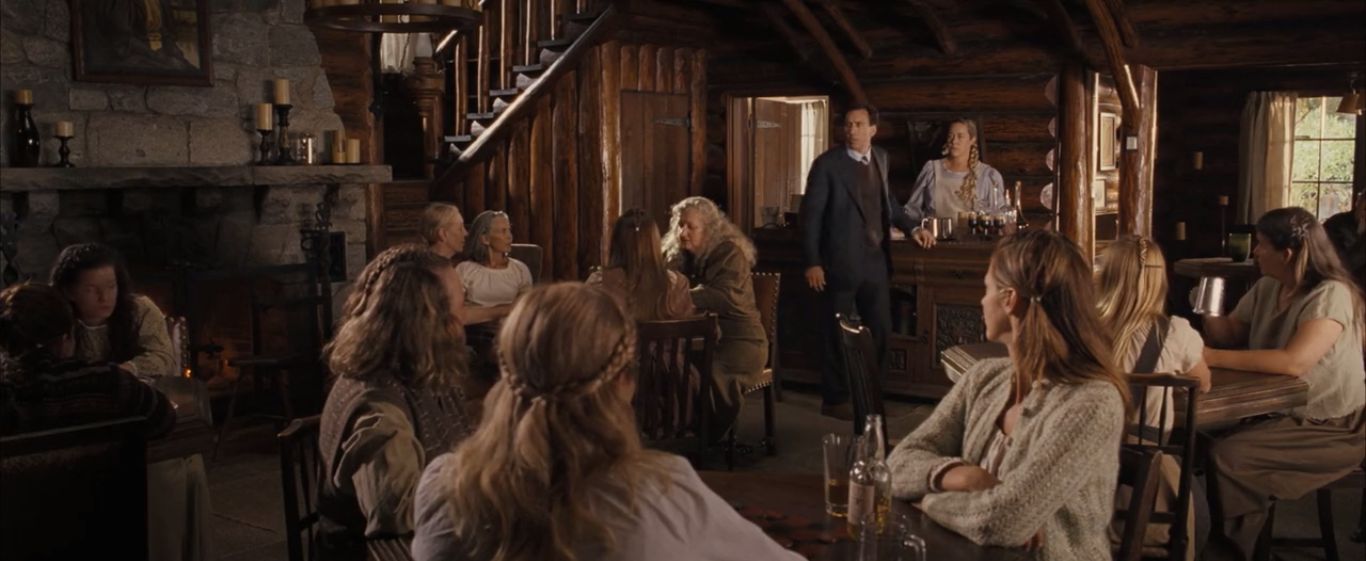
He talks to his ex, Willow (Kate Beahan), who doesn’t feel too bad about having left him, but he needs an answer. He does not understand how a woman could leave him and all he can think of is “Was it some other guy?” because there is no other explanation to him. He cannot grasp the idea of her leaving him to be free and to live with other women. But she doesn’t give him that satisfaction and once he sees women meeting in the dark, talking about “the Wicker Man” he is more and more disturbed. His self-help tape is gone, too, so that now “Everything’s OK!” is not true anymore. The women all live together in a community, but he just wonders “What’s with this sister thing anyway?” never hiding his contempt.
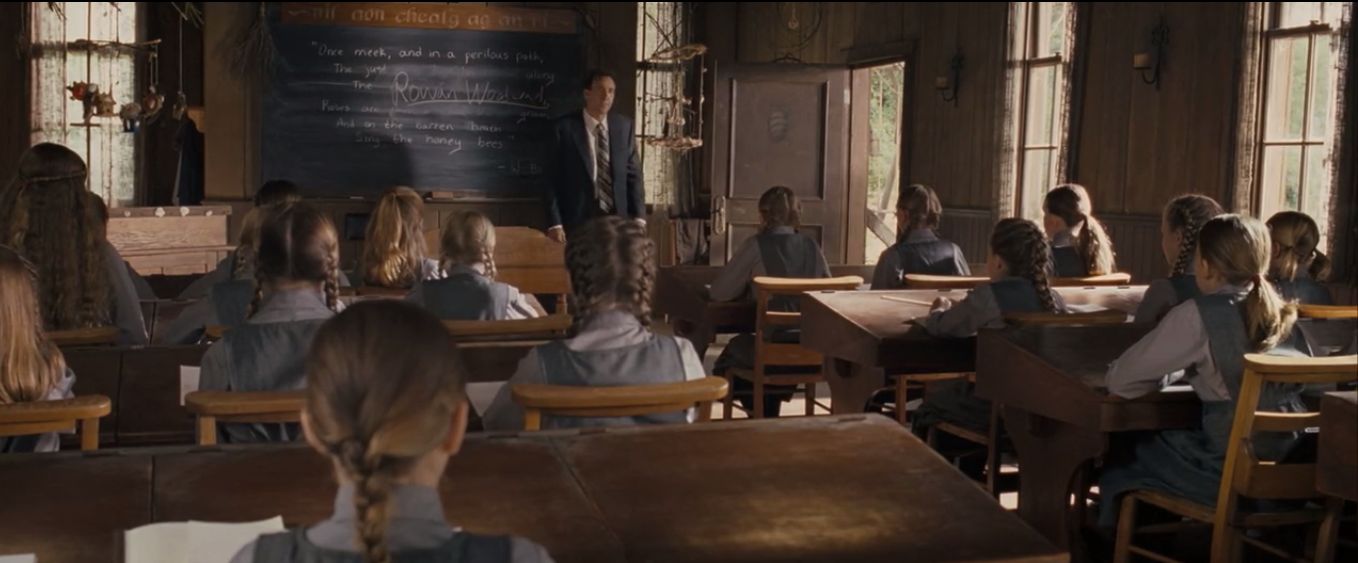
The scene in the school goes a little step further. The children (all girls of course) answer the question: “Can you tell us what man represents in his purest form?” in unison with “Phallic symbol, phallic symbol.” Just in case you weren’t aware how crazy this movie is in bringing across its message. Malus comes in, laughs at this kind of lesson, waves his badge again, even saying “See my badge?”, which in this context very much seems like showing them his penis to impress them. Again, no one cares. The teacher in turn tells him that men in general have “lofty but impractical ideas.” He cleans the board to just write down the girl’s name, again erasing this female education and replacing it with his will. He exists after shouting “You little liars!” at the class of young girls.This trend continues more and more and it would be tiresome to recount all those weird conversations. He meets men but realizes they all can’t talk and are weak. He eventually talks to Sister Summersisle (Ellen Burstyn) after he has almost been killed by bees because he is allergic to them. Is he allergic to being stung, to having something inserted in him? Well, you never know with this movie. Summersisle is the boss of the island and she has some ideas. She explains that they worship “the great mother goddess” and then goes on to actually talk about how their ancestors “rebelled against the suppression of the feminine” and that they “love our men, we’re just not subservient to them.” They need them for breeding, she says to which Malus replies with all the arrogance he can come up with: “Quite a little racket you’ve got yourself going here. Breeding. Sounds like in-breeding to me.” When he finally leaves, she says: “Well, it’s just been fascinating to converse with someone from a normal society.” What a great statement.
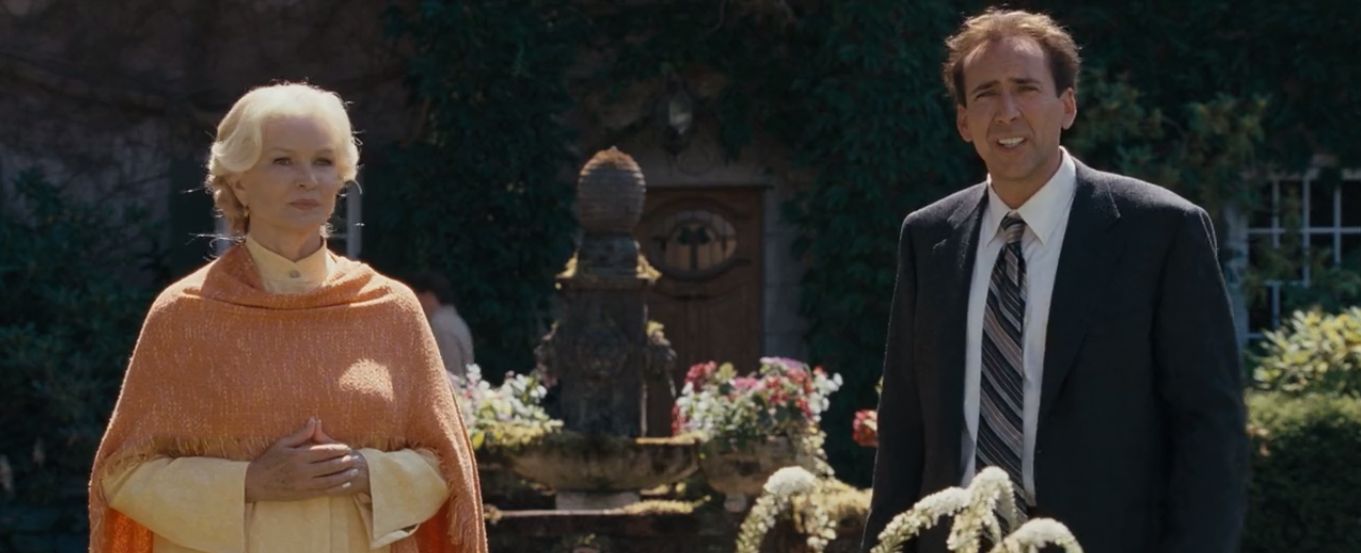
After this scene, the notorious craziness starts and Malus start screaming at people (“How’d it get burned?!”), pulling a gun at the teacher to get her bike (gun, phallic symbol, check), punching out the barmaid after she jokes about him, having an all-out fist fight with another girl (Leelee Sobieski), head-kicking her into a wall and then, yes, he puts on a bear suit and runs through most of the rest of the movie as a bear until is captured, tortured and burned by the Summersislanders.
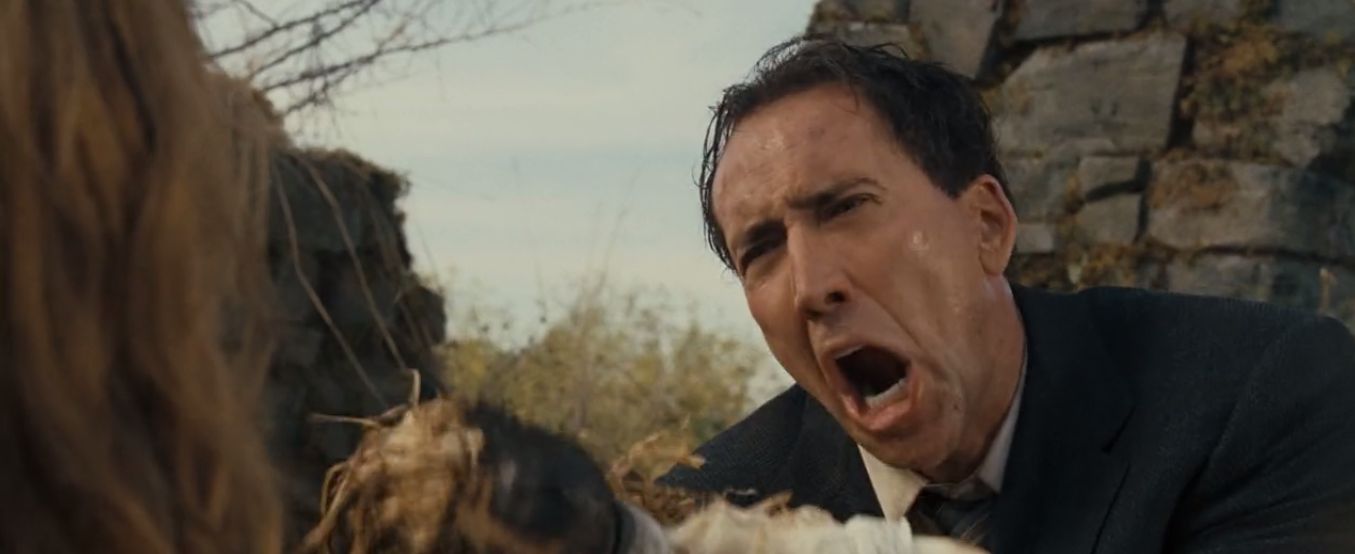
I have to admit, that it is hard to keep up the good will I had for this movie (LaBute and all), after going through it again for this analysis. The thesis holds up as Cage is constantly shown as angry and malevolent (what better word is there?) towards women, while the women are shown as more powerful and superior to men. But. Well, there are so many buts. Even if that is what the movie wants to tell us, hm, what does it want to tell us? That men are misogynist and women are creepy? That being in power means you automatically become cruel? That everyone is awful? The last two sound like LaBute but the movie never really makes anything clear. And normally LaBute uses this kind of worldview with characters who seem normal, in a common setting, showing that everyday people can have evil sides. But here everyone behaves crazy from the get-go. You never feel sympathy for Malus because he acts like a jerk throughout and the female islanders are too creepy to be likable. It might be paradise to them but the movie surely doesn’t want to sell that to us. But it doesn’t want to sell anything except insanity.
The movie shows well that an idea is not enough. If you want to tell a specific story it has to correspond with your ideas. You can’t just throw everything at the screen and hope it works because you just end up with a mess. If you want to have an absurd comedy, make one and don’t pretend you have a horror movie for two thirds and then jump right into super-absurdity mode. If you want to do a horror movie, it’s even worse this way. And if you want to say something about men and women, you probably have a problem if your characters have to spell out some gender studies arguments that don’t fit anywhere. The movie is enjoyable in a way but it is so uneven and weird in a bad way that it never works as anything but unintentional entertainment.

